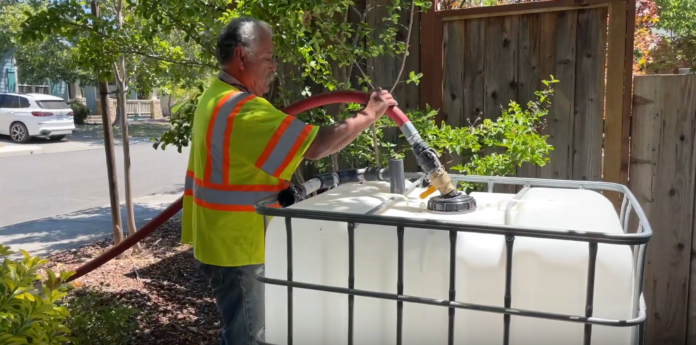
City establishing participant cap, fee for residential recycled water program going forward
The city’s widely popular free residential recycled water delivery program will continue, with an established fee and a participant cap, until Nov. 5.
If Healdsburg doesn’t get any rain by Nov. 5, the city will extend the program, which is currently paid for by the city, to Nov. 19.
With over 1,000 program participants, some residents say they would be willing to pay for the service in order to continue to get thirst stricken trees and plants some much needed water.
According to Healdsburg Utility Director Terry Crowley, the program costs the city roughly $40 per delivery. Program costs to date for the city total roughly $365,000.
Healdsburg city staff recommended using $440,000 in freed up Measure T (formerly known as Measure V, the half-cent Healdsburg sales tax) funds as temporary financial support for the recycled water program.
The recommendation is part of several 2021-22 fiscal year budget amendments that were approved, with some modifications, by the Healdsburg City Council on Tuesday night prior to the recycled water discussion.
Still, the $440,000 would only be a short-term funding fix. During the Sept. 7 city council meeting, Crowley told the council that with no identified program funding past Sept. 25, council could establish a participant fee or other means to recover program costs.
One of the ideas discussed regarding program fees is for residents to opt-in to pay for the program. This would be similar to the city’s green rate, where Healdsburg utility customers can choose whether or not to pay an extra 1.8 cents per kilowatt hour for full green energy.
“To implement a fee we would need a council action and that would be at a subsequent meeting,” said Healdsburg City Manager Jeff Kay.
During public comment, some people also expressed concern that if recycled water deliveries were to end soon homeowners would flip their irrigation switch back on and go back to using fresh water despite the city’s irrigation prohibition.
“If you shut down this program people are going to start using fresh water to keep their trees alive,” resident Michael Hoevel said.
“I’m speaking to you today to encourage you to dig deep, get creative and find a way to fund or subsidize and continue the water delivery program through October or later if we don’t get any rain,” Kris Loomis, a certified irrigation designer and auditor, said. “Shifting this program from water use to water capture would be the perfect way to sunset a program like this, but we need to hang on to it for just a little bit longer. I fear if the program ends soon, residents will flip the irrigation switch back on, which will not be a positive conclusion to this program. Let’s keep our trees and the program alive and then hopefully mother nature will take over.”
Following resident input and council discussion, the program end date of either Nov. 5 or Nov. 19 was established.
Crowley said these would be good end dates since by then the days are shorter, temperatures are cooler and there’s less of a need to water plants, and hopefully by then, there will be some rain.
The council unanimously supported the November end date.
Mayor Evelyn Mitchell said she’d like to see the program run as long as possible and understands concerns regarding the community’s water stressed trees.
Councilmember Ariel Kelley was also supportive of the end date and said creating a fee-based water delivery program makes sense, although she’d like to see city staff look into other possible water conservation projects.
“Obviously this program has had such tremendous success. I think we anticipated 200 households and now we have over 1,000. Clearly this met a demand in a perfect way for our community and I think people who are receiving water are very grateful to be receiving it,” Kelley said. “If we do end the program people will possibly — I can’t say with certainty — start watering their plants with potable water and I think that really speaks to the fact that this is not a true conservation solution, it is a temporary band aid and at some point when we rip the band aid off we will have not created any net new true conservation. In looking at the charts in the urban water management plan, we have to increase true conservation.”
The recycled water delivery program topic will return to the council at a future date, either in the consent calendar or in the regular agenda, in order for the council to approve and pass a suggested program fee.







